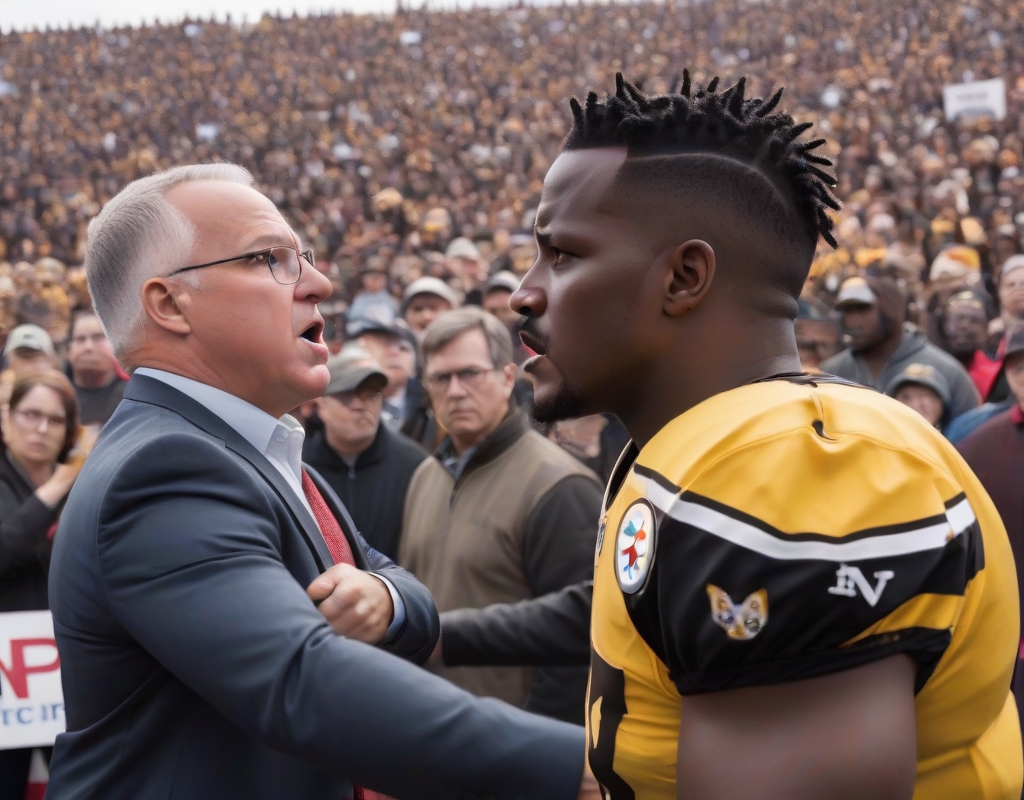Antonio Brown, the former NFL wide receiver, is no stranger to stirring up controversy both on and off the field. Known for his formidable playing days and equally notable off-field headlines, Brown has recently fixated on a new target—Minnesota Governor Tim Walz. During an appearance at a political rally featuring Donald Trump in Pennsylvania, Brown didn’t hold back, unleashing a series of critiques aimed at questioning Walz’s credentials both as an athlete and as a coach.
Brown’s main contention rests on Walz’s background as a coach for Mankato West High School in Minnesota, where Walz spent some years before diving into his political career. In his brash style, Brown declared, “He’s not a real football coach and could never guard me,” underscoring his belief that Walz’s experience did not meet the aspirations of leading and training at elite levels in sports. However, those familiar with Walz’s tenure at Mankato West recognize his significant contributions to nurturing young athletes, emphasizing discipline and academic achievements alongside sports.
Adding more fuel to his fiery rhetoric, Brown disparagingly referred to Walz as “Tampon Tim”—a remark aimed at mocking Walz for supporting a state policy that mandates the provision of free menstrual products in schools. This legislation, widely praised for promoting menstrual equity and inclusiveness, seems to stand in contrast with Brown’s sensibilities. His derogatory label has sparked considerable backlash from various advocacy groups and women’s rights organizations, which have condemned his comments as simplistic and a gross misrepresentation of an inclusive public health policy.
Simultaneously, Brown expressed his preference for business conditions under Trump’s leadership compared to what he perceives would prevail under leaders like Kamala Harris or Tim Walz. His overt endorsement of Trump lines up with his robust, often polarizing statements that resonate with certain factions of the public who appreciate his unapologetic manner.
The event was also a display of camaraderie among former sports professionals with shared ideologies, highlighted by the appearance of Le’Veon Bell, Brown’s former Pittsburgh Steelers teammate. Bell, donning attire supportive of Trump, underscored the unity in their political leanings. This solidarity exemplifies a growing trend where athletes extend their influence beyond sports into political arenas, thereby contributing to and sometimes swaying public discourse.
Antonio Brown’s career in professional football was marked by notable success, including his long tenure with the Steelers and a Super Bowl victory with the Tampa Bay Buccaneers. Although his career had its share of controversies, Brown’s shift from professional sports to a more vocal socio-political commentator has been seamless, characterized by his willingness to direct sharp critique at political figures aligning with his robust opinions.
The reaction to Brown’s comments has been mixed. While his bravado and candor garner admiration from a segment of his followers, others critique his approach, especially his denouncement of gender-affirmative policies, as unsympathetic and divisive. At the heart of Brown’s dialogue is a crucial conversation about the role of public figures in shaping policies and societal norms.
Brown’s overt critique of Walz, laden with personal jabs and stark disagreement with progressive policies, not only continues his trend of outspokenness but also cements his position as a figure eager to influence broader socio-political narratives. This interaction reflects the power sports figures can wield as influencers and commentators in political spheres, bridging cultural and societal discussions.
As we look at the broader implications of such public stances, it’s evident that figures like Antonio Brown play a significant role in molding public opinion. Whether viewed as disruptive or enlightening, his capacity to engage with and provoke public discourse continues to make him a compelling figure far beyond the football field. As society navigates the intersections of politics, sports, and celebrity influences, the narrative shaped by people like Brown holds substantial weight in influencing public discussions and potentially, policy directions.
The case of Antonio Brown versus Tim Walz underscores an era where the lines between celebrity, sports, and politics increasingly blur, creating a complex tableau of public discourse that influences societal values and norms. Moving forward, the evolution of this discourse, fueled by personalities like Brown, will undoubtedly be crucial in shaping the cultural and political climate.




